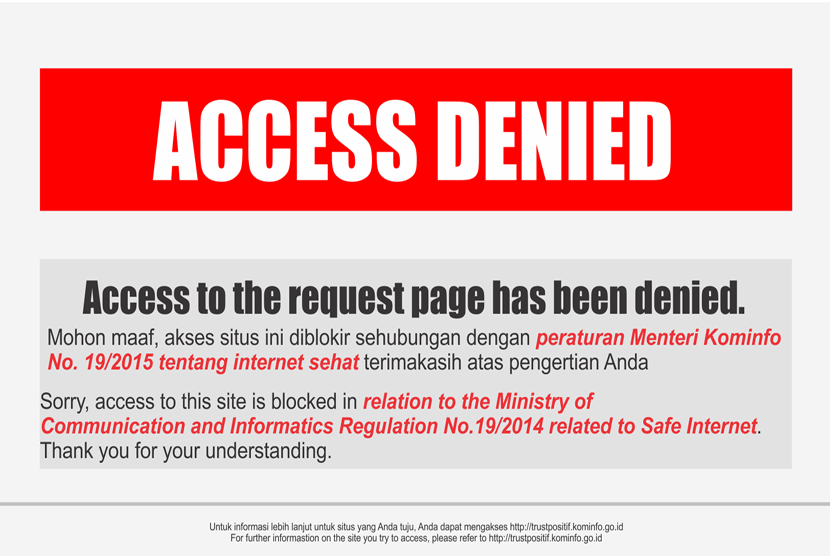REPUBLIKA.CO.ID, JAKARTA -- The Indonesian police claim that the 19 websites that were blocked did, indeed, carry radical content.
"The websites were dangerous; their content was provocative. So they had to be blocked," spokesman for the National Police (Polri) Brig. Gen. Anton Charliyan said at the Police Headquarters here on Wednesday.
He admitted that the Polri advised the National Counterterrorism Agency (BNPT) to have the websites blocked. The BNPT then passed on the suggestion to the Communication and Informatics Ministry that blocked the sites.
"We only made an appeal, following which the BNPT suggested it (the blocking) to the Communication and Informatics Ministry," the policeman stated.
In response to questions from the press about some protests against the blocking, he noted that the police did not mind. The blocking was carried out based on strong evidence, he added.
A number of online media houses whose websites were shut down by the ministry complained about the same to Commission I of the House of Representatives (DPR).
A member of the editorial management of voaislam.com, Aendra, said his website had been blocked by the ministry without a prior notice.
In addition, a spokesman for hidayatullah.com, Mahyadi, remarked that he had asked the communication and informatics ministry's official about the reason for the blocking, to which the official responded saying it was done based on an instruction from the BNPT.
Mahyadi claimed that his site never carried news or articles considered radical or dangerous. He wanted to know the criteria based on which news and articles are considered radical.
Since March 29, the ministry has blocked 19 websites based on reports from the BNPT that they spread radical ideology.
The BNPT, in its letter number 149/K.BNPT/3/2015, requested for the 19 websites to be blocked, stating that they promoted radical ideology and sympathizers of radicalism.
The 19 Islamic websites were arrahmah.com, voa- islam.com, ghur4ba.blogspot.com, panjimas.com, thoriquna.com, dakwatuna.com, kafilahmujahid.com, an-najah.net, muslimdaily.net, hidayatullah.com, salam-online.com, aqlislamiccenter.com, kiblat.net, dakwahmedia.com, muqawamah.com, lasdipo.com, gemaislam.com, eramuslim.com, and daulahislam.com.
Moreover, a legislator said he regretted that the Islamic websites had been blocked without sufficient clarification.
"Arbitrary blocking of Islamic websites is greatly regrettable. It is tantamount to returning to the repressive and authoritarian regime of the New Order," Almuzzammil Yusuf of commission I of the parliament stated here on Wednesday, referring to the authoritarian administration of former president Suharto.
The Communication and Informatics Ministry blocked the websites on the recommendation of the BNPT.
Yusuf pointed out that the government should have first warned the owners of the websites and summoned them for dialogs before starting the crackdown.
The owners of the websites should have been given the right to clarify, and if they had refused to be cooperative, the government could have then taken the necessary measure, he noted.
"Their refusal to cooperate could have been exposed for the public to take record," he said.
Yusuf noted that the BNPT should coordinate with the Communication and Informatics Ministry to determine which of the websites were against Islamic teaching.
Opinions of experts, religious leaders and the Indonesian Council of Islamic Scholars (MUI) should be heard, he added.
Commissions I, III and VIII will demand explanations from the communication and informatics minister, the religious affairs minister and the BNPT regarding the crackdown on the websites.
Furthermore, Chairman of Commission VIII of the parliament Saleh Partaonan Daulay asked the operators of the Islamic websites suspected of spreading radicalism to openly counter the allegation against them if they felt they were being treated unfairly.
Daulay also urged followers of all religious faiths to not be provoked by the conflicting opinions over the blocking of the Islamic websites, even if the measure was viewed as being unfair to certain religious groups.
"Religious harmony must be maintained. The prevailing socio-political situation could be easily exploited by irresponsible people to create conflicts," he cautioned.
He also urged the Islamic community to not pay heed to calls for demonstrations, which would only harm the public in general.


